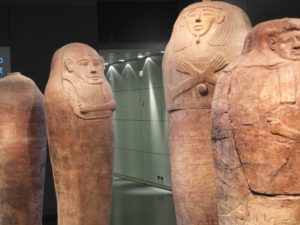Today we begin Deuteronomy Chapter Fourteen.
For the Complete Jewish Bible, click here.
For the King James version, click here.
“You are the people of Adonai your God. You are not to gash yourselves or shave the hair above your foreheads in mourning for the dead, because you are a people set apart as holy for Adonai your God. Adonai your God has chosen you to be his own unique treasure out of all the peoples on the face of the earth.”-Deuteronomy 14:1-2
Recall a couple of days ago we did a study on the phrase “sons of Belial”.
The original Hebrew is BENE BELIAL and literally means “sons of scoundrels” or “sons of worthlessness”.
Well, Deuteronomy Chapter 14 starts off with the exact opposite phrase: BENE YAHWEH.
This of course means the sons of or the children of the Living God.
The BENE BELIAL are an evil people opposed to God and the BENE YAHWEH are those people who are for God and His purposes.
Since God considers Israel to be a holy people attached to Him, He makes it clear His people are NOT to do things the way Canaanites do them.
We’re going to see God specifically prohibiting Israel from adopting certain rituals and practices simply because the Canaanites did them.
Here in Chapter 14, the Lord begins by addressing the mourning practices of the Canaanites.
In mourning their dead, the common practice throughout the Middle East and most of the known world at the time was for males to shave their heads and slash themselves to the point of bleeding.
God is telling Israel, you are absolutely NOT to do these things because you are a holy people who have been set apart for Me.
This instruction is also connected to the Torah principle behind God’s holiness that says holy things must not have any defects.
Recall that animals sacrificed to the Lord on the Brazen Altar weren’t allowed to have any blemishes, scars or be sickly or weak in any way.
They had to be in perfect condition with zero defects.
This same principle also carried over to the priesthood.
Any priest who had a physical deformity such as a burn mark, a deep scar or a missing limb from birth could not serve as a priest.
This same principle also carried over to the common population of Israel.
While a Hebrew with a birth defect was not necessarily penalized by God or considered cursed, one thing he was not to do was intentionally create a defect by scarring or disfiguring himself in anyway as the Canaanites did in their mourning practices.




The Most high also commanded whenever one became unclean, for example if one was under the vow of the Nazarene, if they break the vow and become unclean before its completion, by going near or touching a dead body, they must shave their head, for they are unclean…